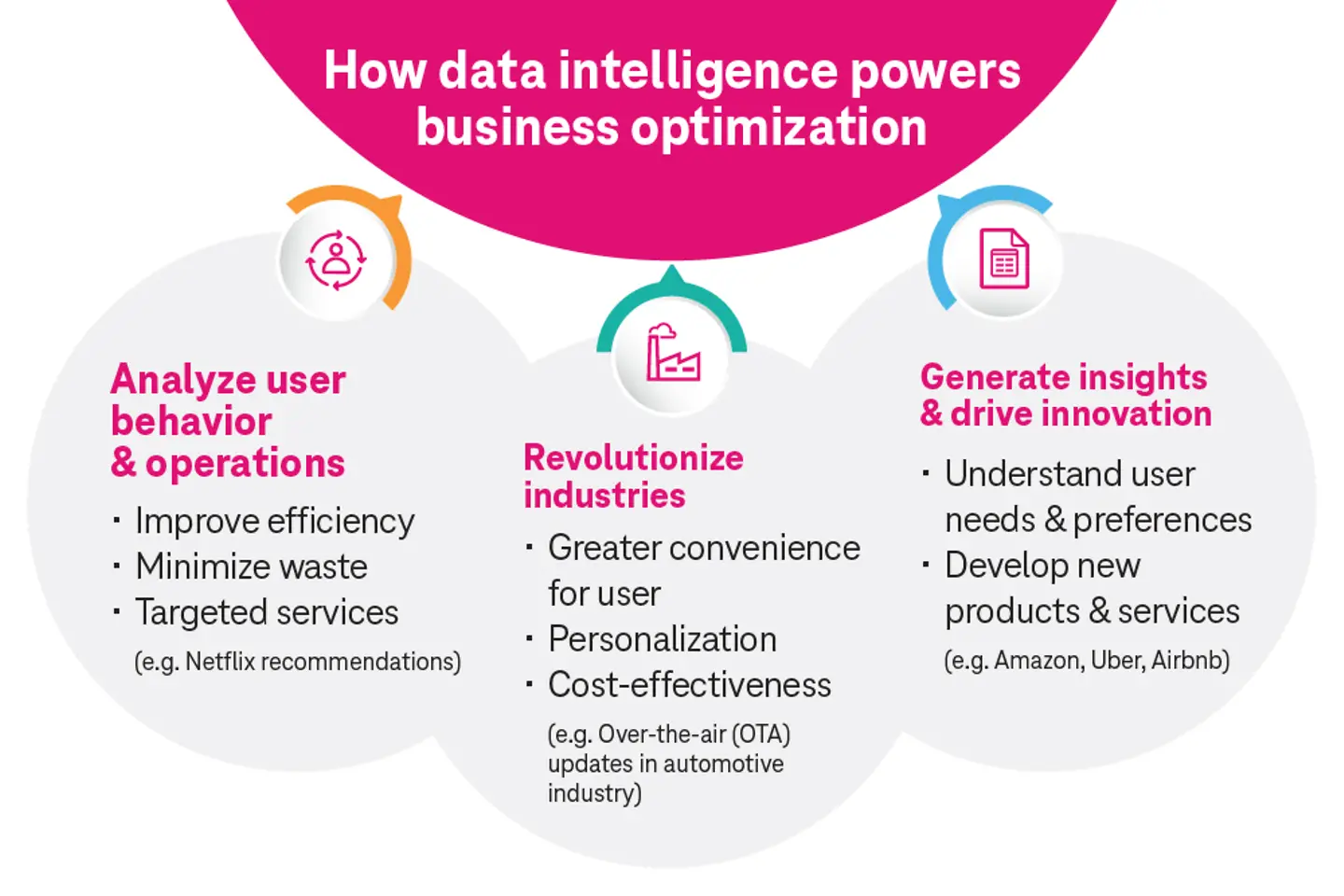
Human beings first understanding of production occurred after the shift from hunter-gatherer societies to agrarian ones. The focus on land, labor, and capital that started with agriculture intensified with the industrial revolution. Machines replaced manual labor, and rapid progress followed. Despite these strides, the holistic optimization of land, labor, and capital has proven elusive, yet data offers a promising avenue for addressing this challenge.
In the current times, a revolutionary concept known as the sharing economy is challenging the model of production factors. Pioneering companies such as Uber and Airbnb have disrupted entire industries by leveraging trending technologies. American companies are leading from the front when it comes to digital transformation, and the Asia-Pacific region is a close second, while Europe is third.
Technology giants such as Google, Facebook, and Amazon thrive on ‘data’ – a resource not explicitly accounted for in the traditional model. This isn't simply raw information; it’s the lifeblood of their operations.
Sven Löffler, Head of Data Spaces & Data Products at T-Systems International
Europe is currently at a point where the scales could tip either way. According to a study, by 2025, the continent could either achieve an increase of 1.25 trillion Euros in gross industrial value add or suffer a loss of value added of 605 billion Euros — if correct measures are not taken (Source: Roland Berger).
With data intelligence and digital technologies, Europe can propel innovation and enhance competitiveness across various sectors. Key industries that could benefit include transportation, logistics, medical technology, electrical and mechanical engineering, chemistry, and aerospace. It is therefore evident (and we’ll also explore how in later sections of this blog) that the continent’s economic landscape presents a promising opportunity for growth, and this will come through digital transformation.
Uber and Airbnb took pioneering strides in digitalization and leveraged the mobile app, seamlessly connecting users with underutilized resources (cars and spare rooms) through GPS location services and real-time communication. This was further enhanced by sophisticated tools such as mapping and machine learning, optimizing everything from routes to pricing. This tech magic transformed the shared economy by creating a user-friendly platform for peer-to-peer transactions, empowering both providers (drivers and hosts) and consumers (riders and travelers) with greater flexibility and access. Also, instead of individuals owning everything they need, a platform facilitated sharing of those assets, leading to a lighter asset footprint, and enabling an efficient, adaptable, and sustainable business model.
Speaking of smart examples, Amazon could be another one with its network effect model. Amazon, with its e-commerce website, connects buyers and sellers, without owning inventory. Here, the key is that businesses that thrive on network effects prioritize user growth over physical assets, and this allows for rapid and efficient scaling.

But why do we need to rely on data? In today’s data-driven economy, it unlocks valuable insights from massive amounts of information that usually lie dormant and scattered in organizations. This translates to understanding customer behavior, predicting market trends, and streamlining operations. With this knowledge, businesses can make smarter decisions, optimize performance, and stay ahead of the competition. In short, data intelligence is the key to turning information into profit in today’s world.
GAIA-X and IDSA are two intertwined European initiatives aiming to establish a trusted and secure data infrastructure. GAIA-X envisions a large-scale, federated data ecosystem with common standards and regulations for data exchange. IDSA focuses on creating standardized methods for secure and private data exchange through their data space architecture. Together, they provide the foundation and building blocks for a thriving European data economy.
Data sovereignty beyond security
In Europe, businesses want to innovate together, but they also desire a strict hold over their own data. Traditional data storage methods often lead to messy, siloed data that hinders analysis. The Data Intelligence Hub by T-Systems tackles this problem by enabling secure data sharing with a unique focus on data sovereignty, with the benefits of improved data quality, enhanced competitiveness, increased resilience, data as secure product, and business innovation.
T-Systems: A vocal advocate and leader
Our focus on data sovereignty aligns perfectly with the goals of GAIA-X and IDSA. We have worked extensively on core data space technology projects and contributed to key GAIA-X initiatives, particularly in the automotive sector. It is important for us that we comply with IDSA and GAIA-X standards, ensuring customers retain control over their data. Additionally, we provide a "sovereignty all the way" option for hosting data spaces on sovereign cloud infrastructure. But why is this so important?
The data conundrum
While data intelligence is the buzzword these days, businesses face multiple challenges while attempting to leverage data securely. The best example here is the automotive industry. Because it struggles with a lack of trust around data security due to extreme competition, collaborations with other entities become difficult. In the absence of collaboration, innovation is hampered. This results in data silos, which prevent a holistic view of the supply chain, widening the gap between businesses and their progress.

We have been one of the front runners in the space for quite some time now. By leveraging innovative techniques in data analysis (including big data, data mining, machine learning, and advanced frameworks) and its domain-specific expertise, T-Systems equips businesses to unlock the true potential of their data and gain valuable insights. Let me share with you some great examples:
Acting as the gatekeeper for Catena-X: The lynchpin of Catena-X is data, the lifeblood of collaboration within the automotive industry. T-Systems acts as a gatekeeper, verifying credentials and issuing certificates to participants. This ensures a trusted environment where companies retain control over their data (data sovereignty) while enabling secure exchange. This free flow of verified information across the supply chain unlocks a treasure trove of benefits. Imagine car manufacturers using real-time data from suppliers to predict and prevent part shortages or collaborating on sustainable practices with a clear picture of each other’s carbon footprint. This data-driven approach revolutionizes and fosters innovation, streamlines processes, and ultimately paves the way for a more resilient and efficient automotive industry.
Knorr-Bremse, a company in the railway industry, wanted to benefit from digital data exchange, but struggled with maintaining control over their confidential information. Their challenge was: securely collaborating with partners while keeping their own data safe. We offered our Data Intelligence Hub platform, which acted as a secure "sandbox" where Knorr-Bremse and its partners could test data exchange functionalities. Knorr-Bremse gained a user-friendly platform for uploading, downloading, and analyzing data. They could also develop custom applications within the data space. More importantly, the platform ensured complete control over data access and management, addressing the client’s initial concern about data sovereignty. This successful implementation provided Knorr-Bremse a competitive edge, enabling them to explore new use cases and innovative business models.
You can display all external content on the website at this point.
I agree that personal data may be transmitted to third-party platforms. Read more about this in our privacy policy.
All in all, the rise of data as a production factor necessitates a fundamental shift in how we view and manage the creation of goods and services. No longer is the focus solely on raw materials and labor. From manufacturing that optimizes assembly lines based on real-time data to healthcare that personalizes treatment plans using patient information, every industry must adapt in order to survive. This data-driven approach promises increased efficiency, reduced waste, and hyper-personalization of products and services. However, making this transition is not an easy task—organizations must deal with problems such as data silos, entrenched mindsets, lack of expertise and experience in handling data, lack of the right-fit ICT provider, and so on. With our demonstrated expertise in this domain, we can be a worthy partner in your data-driven journey.
If you’re interested to know more, feel free to reach out to me. Also, stay tuned for my upcoming blog, in which I will discuss how businesses can connect and integrate into data spaces with AI-automation in order to decrease overall costs and boost productivity.